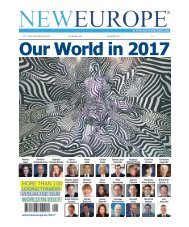FAITH & FREEDOM OF BELIEF-2019
Create successful ePaper yourself
Turn your PDF publications into a flip-book with our unique Google optimized e-Paper software.
FAITH & RELIGIOUS FREEDOM
... in the last year several individuals
who were jailed because of their
religion or beliefs have been released
from detention, after concerns raised
by the international community.
Beyond local and regional situations, the work for human
rights is and must be a global effort. As EU, we believe that
the United Nations is the natural forum to advance and protect
human rights. Global rules and international agreement
should not be perceived as a constraint for some, but as a
protection for all. We also work actively with other regional
organisations such as the OSCE and we firmly believe in the
importance of regional human rights mechanisms.
The Human Rights Council in Geneva and the UN General
Assembly’s Third Committee in New York are pivotal in our
collective efforts to promote freedom of religion and belief.
Through those fora we have supported countries that wish
to better guarantee their citizens’ freedoms, and highlighted
egregious violations in need of urgent attention.
For many years the European Union has led strong resolutions
focused on freedom of religion and belief in both the
Human Rights Council and UNGA Third Committee. Last
March, the EU led the FoRB resolution at the Human Rights
Council, which renewed the mandate of the UN Special Rapporteur
on FoRB for a further 3 years. The work of the UN
Special Procedures is fundamental to monitor human rights
violations around the world as well as to assess and advise
governments on how to improve protections including
through legislation.
Far from being static, multilateralism and UN mechanisms
allows us every year to promote and protect FoRB through
new tools. The establishment in 2019 of an International
Day against religious persecution (22 August) represented
a good opportunity for all of us to publicly show our commitment
to tackling violence against believers and non-believers.
Several EU Member States, and non-European countries
have been strengthening their FoRB diplomacy by creating
mandates of Special Envoys for FoRB or by creating focal
points in their ministries of Foreign affairs. This has allowed
a stronger diplomatic coordination to discuss FoRB violations
and identify joint actions of public or silent diplomacy.
Finally, defending FoRB requires investment into educating
about religion and belief – and an openness to engaging civil
society actors whether faith-based and to their contribution
to the overall challenge of how we live together – here in
Europe and beyond. With this aim, the High Representative/
Vice-President Federica Mogherini launched the Global Exchange
on Religion in Society on 6 September.
The ‘Religion in Society’ approach recognises religion as an
important social force throughout the world. It emphasises
the importance of engaging religious or faith-based actors
alongside other relevant and non-religious or more secular
actors, to address the issues of living together in a globalised
world. Unlike other approaches, which privilege the position
of belief and generally expect participants to ‘declare’ a faith
identity as a condition of entry, the “Religion in Society” approach
more easily takes into account secular, humanist, or
non-religious positions. Concretely, the suggested exchange
platform will aim to connect and empower community voices,
who as active practitioners in their respective (majority/
minority) local settings are navigating issues like shared citizenship,
belonging, and management of cultural diversity.
OUR WORLD | 2019
27










